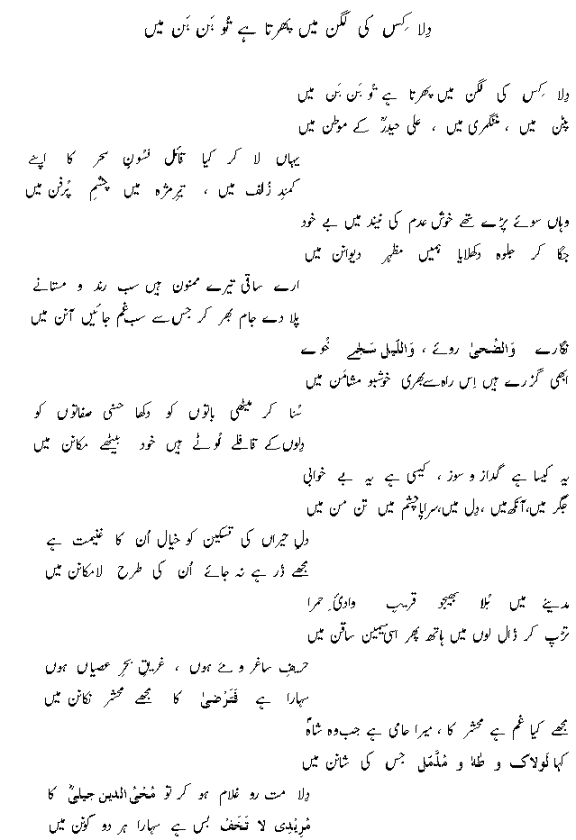An expressive poem in Urdu

Who is it, O my heart ! in search of whom thou strayest from place to place?
Staying, in turn, in Pakpattan, Montgomery (the present Sahiwal), and in the native place of Ali Haider.
(The Great Creator), by bringing us this world, hath convinced us about the charm of his (creative) magic;
In the form of the noose of the locks of hair, the arrows of the eyelashes, and the eyes full of cunning.
We were enjoying the peaceful slumber of nothingness (in the erstwhile world of spirits);
(Then) He awakened us (from that slumber), and showed us the (dazzling) spectacle of His Creative Being.
O Cup Bearer! All the lovers of wine are beholden to Thee;
Give us that cupful, which relieves us of all our sorrows instantaneously.
That darling with a sunny complexion, and "night-like" dark eyes (references to the Holy Prophet (P.B.U.H), drawing upon the first two verses of Surah XCIII of the Quran);
Appears to have passed by this way, filling my whole being with fragrance.
With winsome speech, and excellent traits and character, he has plundered the caravan of (lovers') hearts (everywhere), while he himself is firmly ensconced in his abode (i.e., his tombing Madina).
What heartache and torment, and what loss of sleep (he has caused) in the liver, the eyes, the heart, and indeed in the entire physical frame (of his admirers)!
The mere thought of him is enough to sooth my bewildered heart;
Indeed, I am afraid lest it (i.e., my heart) also strays into spacelessness like him (i.e., the Prophet himself).
(Be gracious enough to) summon me to Madina near the valley of Hamra,
So that I could grasp your silvery shank (as a gesture of humility) once again, with trembling hands and a writhing heart.
I am fond of the cup and the wine (of love), and am also plunged in the ocean of sin;
My only hope (for divine pardon) on the Day of Judgment lies in the promise held out in the word (Fatardhaa) in the Holy Quran.
[Note: This refers to Verse 5 of Surah XCIII of the Quran, (Translation):
"And presently thy Lord shall give thee (O Prophet) that (Wherewith) thou shalt be well-pleased". The implication is that at the Prophet's (P.B.U.H) intercession on the final Day, Allah shall pardon the sinning believers of his Ummah, thereby causing happiness and satisfaction to him].
Why should I grieve with respect to the Final Day, when I have been assured protection and patronage by that King (of All prophets), in whose honour the words "Laulaaq", "Taa'haa" and "Muzammil" have been pronounced?
[ Note: The afore-mentioned three words refer to:
"Laulaaq" - The divinely hadith (Hadith-e-Qudsi) of the Prophet (P.B.U.H: Had it not been for thee (O Prophet), I would not have created the heavens (i.e., the universe).
"Taa'Haa" - The opening verse of Surah XX of the Holy Quran, which is construed by many commentators as an appellation of the Holy Prophet (P.B.U.H)
"Muzammil" - The opening suran of Surah LXXIII of the Quran, which thus addresses the Prophet (P.B.U.H): "O Prophet (P.B.U.H) Thou wrapped up in thy garments!" The Prophet (P.B.U.H) was affectionately addressed thus to re-assure and comfort him, as he sat wrapped up in his mantle, in a melanboly and passive posture, being reviled by some of the Quraish in the early days of his ministry].
O my (aggrieved) heart! DO not cry (in despair), since thou art a humble slave of Muhyuddin of Jilan (i.e., Hazrat Ghaus-e-Azam (R.A));
The Ghaus-e-Azam's words: "O my disciples! Do not fear" are enough as a solace for thee in both the worlds (i.e., this world and the next).